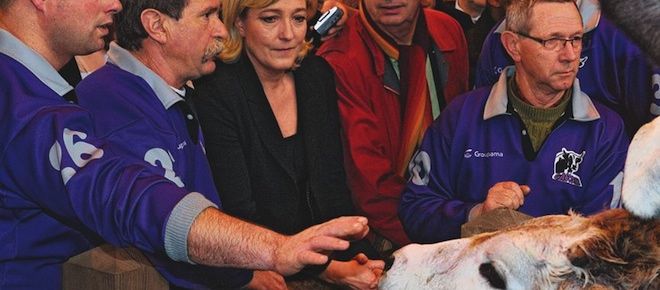France and Quebec’s artificial controversy over halal meat
The lands of foie gras and puppy mills are suddenly horrified by animal slaughter
Share

With the American Republican primaries in full swing, it’s easy to forget that U.S. politics doesn’t have a monopoly on ignorance. Thanks to France’s right-wing National Front party, and Canada’s very own, very left-wing Parti Québécois, it appears that SantoRomNewt may have something in common with French leaders (despite Newt’s attack ad on Mitt Romney for speaking French): a penchant for anti-Muslim rhetoric. At issue is the halal meat controversy, possibly the most bogus animal rights campaign in recent history. Its chief spokesperson is sometimes-starlet, sometimes-xenophobe Marine Le Pen, of the aforementioned NFP. Le Pen is deeply disturbed by the notion that non-Muslim French citizens are “unwittingly eating halal meat,” which she contends comes from animals that are being inhumanely slaughtered. The ritual method through which halal meat is slaughtered (as with kosher meat, using a single incision to the jugular) is just as legal in France as the secular alternative (“captive bolt stunning,” in which the animal is sedated via stun gun before it’s killed), but Le Pen maintains that halal’s “horrible cruelty” warrants special condemnation. “This is a moral point,” she says. “Don’t French people who don’t want to eat halal have the same rights as Muslims who do?” Even French President Nicolas Sarkozy, who once accused Le Pen of stirring up an “artificial controversy,” has made the alleged cruelty of halal slaughtering a cause célèbre in the upcoming presidential election—perhaps to reel in the country’s right-wing base.
In this hemisphere, the Parti Québécois is no less alarmed. Like Le Pen, the PQ is worried that unsuspecting citizens may be eating halal against their will. “This type of [halal] slaughter slams directly against Quebec values,” the PQ said in a statement recently. (I have yet to find any mention of humane animal slaughter in “The Common Values of Quebec Society,” a provincial document written for immigrant orientation.) The PQ is demanding a report on halal practices from the province, and requesting that all Quebecers be informed about the slaughter methods of their meat, even though one of the province’s biggest meat-processing giants, Olymel, admitted its halal products aren’t entirely halal: “In no way we’re practising traditional halal slaughtering—no way,” spokesman Richard Vigneault told the Canadian Press. In fact, he said, Olymel’s official halal certification process consists of nothing more than “having an imam recite a prayer in the plant and did not affect the slaughtering methods at all.” In other words, it’s Quebec Muslims who are more likely being duped into thinking their meat is technically halal, not the other way around.
Let’s forget for a moment that this impassioned animal rights campaign materialized in the lands of foie gras and puppy mills (Quebec was named “the best province to be an animal abuser” by the Animal Legal Defense Fund), and suppose that Le Pen, Sarkozy and the Parti Québécois are sincere in their concern for the humane treatment of animals. If so, are they right to condemn halal ritual?
Researchers and agriculture boards are split on the issue; some say the secular method is more merciful than halal, while others contend they’re equally humane—or cruel. When Muslims and Jews are forced to defend their dietary laws, they often cite a German study published in 1978 by veterinarian Wilhelm Schulze. After subjecting cattle and sheep to EEG measurements during both slaughter techniques, Schulze concluded that, if performed properly, religious slaughter is no less humane than captive bolt stunning. Likewise, some religious leaders insist that the swift cut to the jugular required in halal and kosher methods acts as its own stunning sedative, rendering the animal unconscious almost instantly—thereby mimicking the standard method.
Among animal rights activists, however, religious slaughter is decidedly unpopular. Britain’s Farm Animal Welfare Council has lobbied for its ban since 1985, and PETA contends that animals are subjected to “prolonged torment.”
There is no argument that when the methods were first adopted, in Biblical and Quranic times, halal/kosher slaughter was by far the most humane method available. The method’s chief defenders believe it still is. So if opponents are truly concerned about the undue suffering they believe the ritual causes, why not appeal to religious groups on the grounds that captive bolt stunning isn’t in violation of their orthodoxy, but in direct keeping with it?
Because that’s not what this debate is really about. Nicolas Sarkozy’s heart doesn’t bleed for cattle. The PQ doesn’t care about meat-packing procedures. And Marine Le Pen is not Temple Grandin. These French leaders are in the grip of subtle but ugly identity politics—one that mistakes xenophobia for cultural values. The greatest indignation in both France and Quebec has not been directed toward the animals’ treatment after all, but toward the possibility that the meat from ritually slaughtered animals might be inadvertently eaten not by Muslims, but by more truly French, ancestrally French, people. So a final word to any politician who has recently jumped on the slaughterhouse bandwagon: expose your preoccupation with religious dietary laws for what it really is—a lingering appetite for racism.